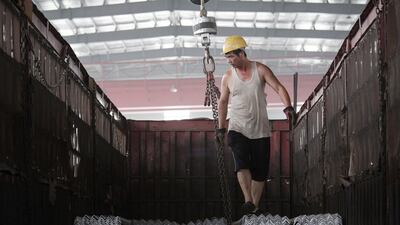The Trump administration raised the stakes in its trade dispute with China on Tuesday, saying it would slap 10 per cent tariffs on an extra $200 billion worth of Chinese imports, including numerous consumer items, sending stocks in Asia skidding.
China’s commerce ministry said it was “shocked” by the latest US trade action and would complain to the World Trade Organisation, but did not immediately say how it would retaliate. It called the actions “completely unacceptable” in a statement released around midday on Wednesday.
Beijing has said it would hit back against Washington’s escalating tariff measures, including through “qualitative measures,” a threat that US businesses in China fear could mean anything from stepped-up inspections to delays in investment approvals and even consumer boycotts. US officials issued a list of thousands of Chinese imports the Trump administration wants to hit with the new tariffs, including hundreds of food products as well as tobacco, chemicals, coal, steel and aluminum.
It also includes consumer goods ranging from car tiyres, furniture, wood products, handbags and suitcases, to dog and cat food, baseball gloves, carpets, doors, bicycles, skis, golf bags, toilet paper and beauty products.
“For over a year, the Trump administration has patiently urged China to stop its unfair practices, open its market, and engage in true market competition,” US trade representative Robert Lighthizer said in announcing the proposed tariffs.
“Rather than address our legitimate concerns, China has begun to retaliate against U.S. products ... There is no justification for such action,” he said in a statement.
Last week, Washington imposed 25 per cent tariffs on $34bn of Chinese imports, and Beijing responded immediately with matching tariffs on the same amount of US exports to China. Each side is mulling tariffs on a further $16bn in goods that would bring the totals to $50bn.
_______
Read more:
China's GDP to ease around 6.6 per cent in the second half of 2018
China’s tariff response takes effect after Trump ignites trade war
UAE-China trade hit almost Dh200bn last year
Middle East tech firms eager to attract investments from $15bn Chinese fund
_______
Investors fear an escalating trade war between the world’s two biggest economies could hit global growth.
On Wednesday, the MSCI’s broadest index of Asia-Pacific shares outside Japan was down about 1 per cent, while the main indexes in Hong Kong and Shanghai recovered somewhat after falling more than 2 per cent.
S&P 500 and Dow futures dropped around 1 per cent, pointing to a weak opening on Wall Street later on Wednesday.
The onshore yuan tracked its offshore counterpart lower with traders closely watching the key 6.7 per dollar level as pressure mounted on the currency.
US President Donald Trump has said he may ultimately impose tariffs on more than $500bn worth of Chinese goods - roughly the total amount of US imports from China last year.
The new list published on Tuesday targets many more consumer goods than those covered under the tariffs imposed last week, raising the direct threat to consumers and retail firms and increasing the stakes for lawmakers in Trump’s Republican party facing elections in November.
The list is subject to a two-month public comment period before taking effect.
Senate finance committee chairman Orrin Hatch, a senior member of Mr Trump’s Republican Party, said the announcement “appears reckless and is not a targeted approach.”
The US Chamber of Commerce has supported Mr Trump’s domestic tax cuts and efforts to reduce regulation of businesses, but it has been critical of Trump’s aggressive tariff policies.
“Tariffs are taxes, plain and simple. Imposing taxes on another $200bn worth of products will raise the costs of every day goods for American families, farmers, ranchers, workers, and job creators. It will also result in retaliatory tariffs, further hurting American workers,” a Chamber spokeswoman said.
The Retail Industry Leaders Association, a lobby group representing the largest US retailers, said: “The president has broken his promise to bring ‘maximum pain on China, minimum pain on consumers.’”
“American families are the ones being punished. Consumers, businesses and the American jobs dependent on trade, are left in the crosshairs of an escalating global trade war,” said Hun Quach, the head of international trade policy for the group.
Louis Kuijs, Hong Kong-based head of Asia economics at Oxford Economics, said while he expects China to strongly condemn the US moves, its policy response is likely to be limited for now.
“In part because they have only limited ammunition and in part because it’s still early in the process on the US side,” Mr Kuijs said.
Earlier in the day, Li Chenggang, assistant minister at China’s Commerce Ministry, said that the latest US proposals would hurt both countries and pointed to declines in Chinese export growth and overseas investment to the United States in the first half of this year.
“It looks like the US just took the scale of the trade frictions to another level,” Mr Li said at a forum in Beijing. “Right now, world trade is relatively chaotic. We believe the US measures interfere with economic globalization and damage the world economic order.”
Mr Trump has been following through on pledges he made during his presidential campaign to get tough on China, which he accuses of unfair trade practices including theft of intellectual property and forced technology transfer that have led to a $375bn US trade deficit with China.
China’s exports have mushroomed since it joined the World Trade Organisation in 2001, making it the world’s second-largest economy and prompting widening criticism in recent ears from trading partners that it has unfairly used global trade rules to its advantage.

